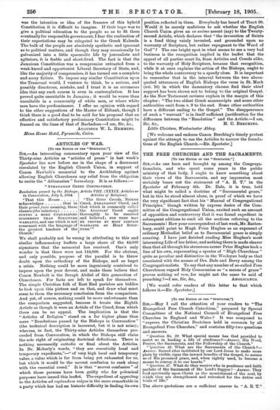Sia,—An interesting commentary upon your view of the Thirty-nine Articles
as "articles of peace" in last week's Spectator lies now before me in the shape of a document circulated by the English Church Union, in support of Canon Newbolt's memorial to the Archbishop against allowing English Churchmen any relief from the obligation to recite the " Athanasian " formulary. It is as follows:— " ATHANABIAN CREED CONTROVERSY.
Resolution passed by the Bishops Article VIII. (MIX. Articles or
in Convocation, July 5, 1904. Articles of Religion).
'That this House The three Creeds, NICENE their prima facie meaning, these
CONVEY A MORE UNQUALYPIED
acknowledges that in clauses (the minatory)
STATEMENT THAN SCRIPTURE that which is commonly called the Aposrlauf Creed ought thoroughly to be received and believed; FOR THEY MAY Creed, ATHANASIUS' Creed, and wAsasbrrs, and one which is not BE PROVED BY MOST CERTAIN consonant with the language of WARRANTS OP HOLY SCRIP- TURE:"
the greatest teachers of the
We shall probably not be wrong in attributing to this and similar inflammatory leaflets a large share of the 44,000 signatures that the memorial has received. One's only wonder is that there were not 144,000. For the obvious, and only possible, purpose of the parallel is to throw doubt upon the orthodoxy of the Bishops, and so beget a 'crisis. Nothing could be more ingeniously contrived to impose upon the poor devout, and make them believe that Canon Newbolt is the Seraph Abdiel of this generation of Churchmen. For facts are left to speak for themselves. The simple Christian folk of East End parishes are bidden to look upon this picture and on that, and draw what must seem to them the necessary conclusion from the comparison. And yet, of course, nothing could be more unfortunate than the comparison suggested, because it treats the Eighth Article as though it were an Article of the Creed; from which there can be no appeal. The implication is that the "Articles of Religion" stand on a far higher plane than mere "Resolutions passed by the Bishops in Convocation" (the technical description is incorrect, but it is not mine); whereas, in fact, the Thirty-nine Articles themselves pro- ceeded from Convocation, in which the Bishops still claim the sole right of originating doctrinal definitions. There is nothing necessarily catholic or final about the Articles. In Dr. Moberly's words, "they are essentially local and temporary expedients,"—" of very high local and temporary value, a value which is far from being yet exhausted for us, but which it would be the merest confusion to rank along with the essential creed." It is that "merest confusion" of which those persons have been guilty who for polemical purposes have issued this leaflet. The expedient of appealing to the Articles ad captandum rulgus is the more remarkable in a party which has had an historic difficulty in finding its own position reflected in them. Everybody has heard of Tract 90. Would it be -merely malicious to ask whetter the English Church Union gives an as animo assent (say) to the Twenty- second Article, which declares that "the invocation of Saints is a fond thing vainly invented, and grounded upon no warranty of Scripture, but rather repugnant to the Word of God" ? The one bright spot in what seems to.me a very bad business is the recognition implied in the leaflet that the appeal of all parties must lie, from Articles and Creeds alike, to the warranty of Holy Scripture, because that recognition, while it at once explains the action of the Bishops, ought to bring the whole controversy to a speedy close. It is important to remember that in the interval between the two above- quoted utterances of English Bishops the verse in St. Mark (xvi: 16) in which • the damnatory clauses find their chief support has been shown not to belong to the original Gospel. ' As the New Testament revisers explain in the margin of this chapter: "The two oldest Greek manuscripts and some other authorities omit from v. 9 to the end. Some other authorities have a different ending to the Gospel." The disappearance of such a " warrant " is in itself sufficient justification for the difference between the "Resolution" and the Article.—I Sir, Ste., H. C. BEECHING.
[We welcome and endorse Canon Beeching's timely protest against the attempt to use the Articles to narrow the founda- tions of the English Church.—ED. Spectator.]






































 Previous page
Previous page